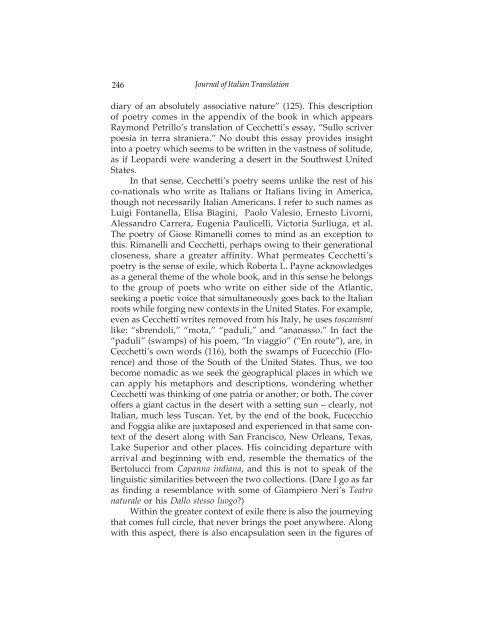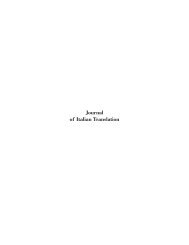Journal of Italian Translation - Brooklyn College - Academic Home ...
Journal of Italian Translation - Brooklyn College - Academic Home ...
Journal of Italian Translation - Brooklyn College - Academic Home ...
You also want an ePaper? Increase the reach of your titles
YUMPU automatically turns print PDFs into web optimized ePapers that Google loves.
246<br />
<strong>Journal</strong> <strong>of</strong> <strong>Italian</strong> <strong>Translation</strong><br />
diary <strong>of</strong> an absolutely associative nature” (125). This description<br />
<strong>of</strong> poetry comes in the appendix <strong>of</strong> the book in which appears<br />
Raymond Petrillo’s translation <strong>of</strong> Cecchetti’s essay, “Sullo scriver<br />
poesia in terra straniera.” No doubt this essay provides insight<br />
into a poetry which seems to be written in the vastness <strong>of</strong> solitude,<br />
as if Leopardi were wandering a desert in the Southwest United<br />
States.<br />
In that sense, Cecchetti’s poetry seems unlike the rest <strong>of</strong> his<br />
co-nationals who write as <strong>Italian</strong>s or <strong>Italian</strong>s living in America,<br />
though not necessarily <strong>Italian</strong> Americans. I refer to such names as<br />
Luigi Fontanella, Elisa Biagini, Paolo Valesio, Ernesto Livorni,<br />
Alessandro Carrera, Eugenia Paulicelli, Victoria Surliuga, et al.<br />
The poetry <strong>of</strong> Giose Rimanelli comes to mind as an exception to<br />
this. Rimanelli and Cecchetti, perhaps owing to their generational<br />
closeness, share a greater affinity. What permeates Cecchetti’s<br />
poetry is the sense <strong>of</strong> exile, which Roberta L. Payne acknowledges<br />
as a general theme <strong>of</strong> the whole book, and in this sense he belongs<br />
to the group <strong>of</strong> poets who write on either side <strong>of</strong> the Atlantic,<br />
seeking a poetic voice that simultaneously goes back to the <strong>Italian</strong><br />
roots while forging new contexts in the United States. For example,<br />
even as Cecchetti writes removed from his Italy, he uses toscanismi<br />
like: “sbrendoli,” “mota,” “paduli,” and “ananasso.” In fact the<br />
“paduli” (swamps) <strong>of</strong> his poem, “In viaggio” (“En route”), are, in<br />
Cecchetti’s own words (116), both the swamps <strong>of</strong> Fucecchio (Florence)<br />
and those <strong>of</strong> the South <strong>of</strong> the United States. Thus, we too<br />
become nomadic as we seek the geographical places in which we<br />
can apply his metaphors and descriptions, wondering whether<br />
Cecchetti was thinking <strong>of</strong> one patria or another; or both. The cover<br />
<strong>of</strong>fers a giant cactus in the desert with a setting sun – clearly, not<br />
<strong>Italian</strong>, much less Tuscan. Yet, by the end <strong>of</strong> the book, Fucecchio<br />
and Foggia alike are juxtaposed and experienced in that same context<br />
<strong>of</strong> the desert along with San Francisco, New Orleans, Texas,<br />
Lake Superior and other places. His coinciding departure with<br />
arrival and beginning with end, resemble the thematics <strong>of</strong> the<br />
Bertolucci from Capanna indiana, and this is not to speak <strong>of</strong> the<br />
linguistic similarities between the two collections. (Dare I go as far<br />
as finding a resemblance with some <strong>of</strong> Giampiero Neri’s Teatro<br />
naturale or his Dallo stesso luogo?)<br />
Within the greater context <strong>of</strong> exile there is also the journeying<br />
that comes full circle, that never brings the poet anywhere. Along<br />
with this aspect, there is also encapsulation seen in the figures <strong>of</strong>
















